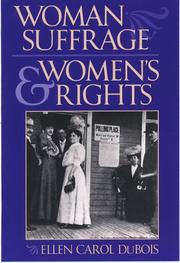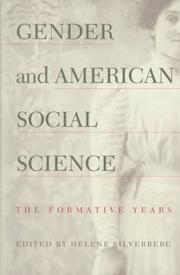| Listing 1 - 5 of 5 |
Sort by
|

ISBN: 0814785409 0585434719 9780585434711 9780814719008 0814719007 9780814719015 0814719015 0814719007 0814719015 9780814785409 Year: 1998 Publisher: New York, NY
Abstract | Keywords | Export | Availability | Bookmark
 Loading...
Loading...Choose an application
- Reference Manager
- EndNote
- RefWorks (Direct export to RefWorks)
An essential examination of the woman suffrage movementIn recent decades, the woman suffrage movement has taken on new significance for women's history. Ellen Carol DuBois has been a central figure in spurring renewed interest in woman suffrage and in realigning the debates which surround it. This volume gathers DuBois' most influential articles on woman suffrage and includes two new essays. The collection traces the trajectory of the suffrage story against the backdrop of changing attitudes to politics, citizenship and gender, and the resultant tensions over such issues as slavery and abolitionism, sexuality and religion, and class and politics. Connecting the essays is DuBois' belief in the continuing importance of political and reform movements as an object of historical inquiry and a force in shaping gender. The book, which includes a highly original reconceptualization of women's rights from Mary Wollstonecraft to contemporary abortion and gay rights activists and a historiographical overview of suffrage scholarship, provides an excellent overview of the movement, including international as well as U.S. suffragism, in the context of women's broader concerns for social and political justice.
Women -- Suffrage -- United States -- History. --- Women -- United States -- Social conditions. --- Women's rights -- United States -- History. --- Women's rights --- Women --- Gender Studies & Sexuality --- Gender & Ethnic Studies --- Social Sciences --- History --- Suffrage --- Social conditions --- 19th amendment. --- books on suffrage. --- citizenship and gender. --- gender rights. --- political justice. --- right to vote. --- suffrage movement. --- women's history. --- women's movements.
Book
ISBN: 0691184275 Year: 2018 Publisher: Princeton, NJ : Princeton University Press,
Abstract | Keywords | Export | Availability | Bookmark
 Loading...
Loading...Choose an application
- Reference Manager
- EndNote
- RefWorks (Direct export to RefWorks)
The important political motivations behind why women finally won the right to voteIn the 1880s, women were barred from voting in all national-level elections, but by 1920 they were going to the polls in nearly thirty countries. What caused this massive change? Why did male politicians agree to extend voting rights to women? Contrary to conventional wisdom, it was not because of progressive ideas about women or suffragists' pluck. In most countries, elected politicians fiercely resisted enfranchising women, preferring to extend such rights only when it seemed electorally prudent and in fact necessary to do so. Through a careful examination of the tumultuous path to women's political inclusion in the United States, France, and the United Kingdom, Forging the Franchise demonstrates that the formation of a broad movement across social divides, and strategic alliances with political parties in competitive electoral conditions, provided the leverage that ultimately transformed women into voters.As Dawn Teele shows, in competitive environments, politicians had incentives to seek out new sources of electoral influence. A broad-based suffrage movement could reinforce those incentives by providing information about women's preferences, and an infrastructure with which to mobilize future female voters. At the same time that politicians wanted to enfranchise women who were likely to support their party, suffragists also wanted to enfranchise women whose political preferences were similar to theirs. In contexts where political rifts were too deep, suffragists who were in favor of the vote in principle mobilized against their own political emancipation.Exploring tensions between elected leaders and suffragists and the uncertainty surrounding women as an electoral group, Forging the Franchise sheds new light on the strategic reasons behind women's enfranchisement.
Women --- Political activity. --- Suffrage --- History. --- Arthur Henderson. --- Catholicism. --- France. --- Gilded Age. --- Representation of the People Act. --- United Kingdom. --- United States. --- World War I. --- class politics. --- democratization. --- electoral competition. --- electoral influence. --- electoral reform. --- female voters. --- male democratization. --- multi-party cabinet. --- political change. --- political emancipation. --- political geography. --- political inclusion. --- religious cleavage. --- suffrage movement. --- suffrage movements. --- suffrage. --- suffragists. --- voting rights. --- wartime cabinet. --- women's enfranchisement. --- women's suffrage. --- women.
Book
ISBN: 9780520283794 9780520959576 0520959574 9780520283787 0520283783 0520283791 Year: 2015 Publisher: Oakland, California
Abstract | Keywords | Export | Availability | Bookmark
 Loading...
Loading...Choose an application
- Reference Manager
- EndNote
- RefWorks (Direct export to RefWorks)
This innovative study presents a new, integrated view of the Civil War and Reconstruction and the history of the western United States. Award-winning historians such as Steven Hahn, Martha Sandweiss, William Deverell, Virginia Scharff, and Stephen Kantrowitz offer original essays on lives, choices, and legacies in the American West, discussing the consequences for American Indian nations, the link between Reconstruction and suffrage movements, and cross-border interactions with Canada and Mexico. In the West, Civil War battlefields and Civil War politics engaged a wide range of ethnic and racial distinctions, raising questions that would arise only later in places farther east. Histories of Reconstruction in the South ignore the connections to previous occupation efforts and citizenship debates in the West. The stories contained in this volume complicate our understanding of the paths from slavery to freedom for white as well as non-white Americans. By placing the histories of the American West and the Civil War and Reconstruction period within one sustained conversation, this volume expands the limits of both by emphasizing how struggles over land, labor, sovereignty, and citizenship shaped the U.S. nation-state in this tumultuous era. This volume highlights significant moments and common concerns of this continuous conflict, as it stretched across the continent and throughout the nineteenth century. Publishing on the 150th anniversary of the end of the Civil War, this collection brings eminent historians into conversation, looking at the Civil War from several Western perspectives, and delivers a refreshingly disorienting view intended for scholars, general readers, and students. Published in Cooperation with the William P. Clements Center for Southwest Studies, Southern Methodist University.
Reconstruction (U.S. history, 1865-1877) --- West (U.S.) --- United States --- History --- Civil War, 1861-1865 --- 1865-1918 --- Carpetbag rule (U.S. history, 1865-1877) --- Reconstruction (1865-1877) --- Postwar reconstruction --- Southern States --- Confederate States of America --- Lost Cause mythology --- 19th century american history. --- american civil war. --- american history. --- american indian nations. --- american reconstruction. --- american west. --- black suffrage. --- citizenship. --- civil war. --- cross border interactions. --- democracy. --- fighting. --- government and governing. --- historical. --- indigenous peoples. --- labor. --- land. --- memory. --- nation state. --- native americans. --- political. --- race and gender. --- race relations. --- reconstruction. --- sovereignty. --- suffrage movement. --- union and confederacy. --- united states of america. --- violence. --- war. --- western united states. --- womens suffrage.

ISBN: 1840003480 Year: 2001 Publisher: London Mitchell Beazley
Abstract | Keywords | Export | Availability | Bookmark
 Loading...
Loading...Choose an application
- Reference Manager
- EndNote
- RefWorks (Direct export to RefWorks)
Jeremy Aynsley --- grafische vormgeving --- reclamevormgeving --- affiches --- platenhoezen --- tijdschriften --- boeken --- boekomslagen --- reclame --- twintigste eeuw --- Behrens Peter --- van de Velde Henry --- Bradley Will --- Gill Eric --- Wiener Werkstätte --- Mackintosh Charles Rennie --- futurisme --- De Stijl --- Lissitzky El --- Rodchenko Alexander --- Bauhaus --- Moholy-Nagy László --- Bayer Herbert --- Tschichold Jan --- fotomontage --- Brodovitch Alexey --- Art Deco --- Teige Karel --- Studio Boggeri --- The Suffrage Movement --- The New Poster --- Sutnar Ladislav --- Werkman Hendrik Nicolaas --- National Identity --- Tomaszewski Henryk --- Massin --- Push Pin Studio --- Zapf Hermann --- Bill Max --- Matter Herbert --- Bass Saul --- Rand Paul --- Pineles Cipe --- Beall Lester --- Lionni Leo --- Villemot Bernard --- Games Abram --- Henrion F.H.K. --- Müller-Brockmann Josef --- Munari Bruno --- Eksell Olle --- Chermayeff Ivan --- Vignelli Massimo --- Brownjohn Robert --- Kamekura Yusaku --- Lubalin Herb --- Crouwel Wim --- van Toorn Jan --- Dumbar Gert --- Cooper Muriel --- Weingart Wolfgang --- Friedman Dan --- Monguzzi Bruno --- Tanaka Ikko --- Reid Jamie --- Greiman April --- Mariscal Javier --- Oliver Vaughan --- Kalman Tibor --- Spiekermann Erik --- Brody Neville --- Barnbrook Jonathan --- Ishioka Eiko --- Carson David --- 766.036 --- Henrion F.H.K --- graphic design --- Graphic artists --- anno 1900-1999

ISBN: 0691048207 0691227683 Year: 1998 Publisher: Princeton (N.J.) Princeton university press
Abstract | Keywords | Export | Availability | Bookmark
 Loading...
Loading...Choose an application
- Reference Manager
- EndNote
- RefWorks (Direct export to RefWorks)
This collection of essays provides the first systematic and multidisciplinary analysis of the role of gender in the formation and dissemination of the American social sciences in the late nineteenth and early twentieth centuries. Other books have traced the history of academic social science without paying attention to gender, or have described women's social activism while ignoring its relation to the production of new social knowledge. In contrast, this volume draws long overdue attention to the ways in which changing gender relations shaped the development and organization of the new social knowledge. And it challenges the privileged position that academic--and mostly male--social science has been granted in traditional histories by showing how women produced and popularized new forms of social knowledge in such places as settlement houses and the Russell Sage Foundation. The book's varied perspectives, building on recent work in history and feminist theory, break from the traditional view of the social sciences as objective bodies of expert knowledge. Contributors examine new forms of social knowledge, rather, as discourses about gender relations and as methods of cultural critique. The book will create a new framework for understanding the development of both social science and the history of gender relations in the United States. The contributors are: Guy Alchon, Nancy Berlage, Desley Deacon, Mary Dietz, James Farr, Nancy Folbre, Kathryn Kish Sklar, Dorothy Ross, Helene Silverberg, and Kamala Visweswaran.
Sex role --- Social sciences --- Women social scientists --- Women --- History --- SCIENZE SOCIALI --- DONNE --- Stati Uniti d'America --- Storia. --- Addams, Jane. --- Babcock, Howard E. --- Breckinridge, Sophonisba. --- Bruere, Martha Bensley. --- Calkins, Mary Whiton. --- Christianity. --- Cox Stevenson, Matilda. --- Davis, Katharine Bement. --- Fletcher, Alice. --- Goldenweiser, Alexander. --- Hammond, Margaret. --- James, William. --- Jones, Nellie Kedzie. --- Kanter, Rosabeth Moss. --- Kingsbury, Susan. --- Laboulaye, Edouard de. --- Leupp, Francis. --- Macfadden, Bernarr. --- National Municipal League. --- Native Americans. --- Nietzsche, Friedrich. --- Parsons, Elsie Clews. --- Pearson, Thomas. --- Platt Smith, Erminnie. --- Rossiter, Margaret. --- Spencer Herbert. --- Victorian gender system. --- academic freedom trials. --- anthropology. --- child labor. --- classes in the United States. --- domesticity. --- economics. --- evolutionary theory. --- family wage economy. --- feminism. --- higher education and women. --- home economics. --- manifest destiny. --- masculinity. --- maternalism and motherhood. --- political science. --- pragmatism. --- psychology. --- romanticism. --- settlement movement. --- social Darwinism. --- suffrage movement. --- trade union activity. --- van Kleeck, Eliza Mayer. --- women’s colleges.
| Listing 1 - 5 of 5 |
Sort by
|

 Search
Search Feedback
Feedback About UniCat
About UniCat  Help
Help News
News